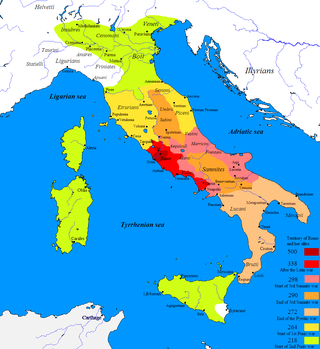Related Research Articles
The year 509 BC was a year of the pre-Julian Roman calendar. In the Roman Republic it was known as the Year of the Consulship of Brutus and Collatinus. The denomination 509 BC for this year has been used since the early medieval period, when the Anno Domini calendar era became the prevalent method in Europe for naming years.

Year 264 BC was a year of the pre-Julian Roman calendar. At the time it was known as the Year of the Consulship of Caudex and Flaccus. The denomination 264 BC for this year has been used since the early medieval period, when the Anno Domini calendar era became the prevalent method in Europe for naming years.

Lucius Junius Brutus was the semi-legendary founder of the Roman Republic, and traditionally one of its first consuls in 509 BC. He was reputedly responsible for the expulsion of his uncle the Roman king Tarquinius Superbus after the suicide of Lucretia, which led to the overthrow of the Roman monarchy. He was involved in the abdication of fellow consul Tarquinius Collatinus, and executed two of his sons for plotting the restoration of the Tarquins.
Decimus Junius Brutus Callaicus was a consul of the Roman Republic for the year 138 BC together with Publius Cornelius Scipio Nasica Serapio. He was an optimate politician and a military commander in Hispania and in Illyria. He was the son of Marcus Junius Brutus and brother of Marcus Junius Brutus. He had a son also named Decimus Junius Brutus and his grandson was Decimus Junius Brutus Albinus.

The magister equitum, in English Master of the Horse or Master of the Cavalry, was a Roman magistrate appointed as lieutenant to a dictator. His nominal function was to serve as commander of the Roman cavalry in time of war, but just as a dictator could be nominated to respond to other crises, so the magister equitum could operate independently of the cavalry; like the dictator, the appointment of a magister equitum served both military and political purposes.

The gens Junia or Iunia was one of the most celebrated families of ancient Rome. The gens may originally have been patrician, and was already prominent in the last days of the Roman monarchy. Lucius Junius Brutus was the nephew of Lucius Tarquinius Superbus, the seventh and last King of Rome, and on the expulsion of Tarquin in 509 BC, he became one of the first consuls of the Roman Republic.
Decimus may refer to:
Decimus Junius Brutus may refer to:
Marcus Junius Pera was a Roman politician before and during the Second Punic War.
Marcus Fabius Buteo was a Roman politician during the 3rd century BC. He served as consul in 245 BC, and as censor, and in 216 BC, being the oldest living ex-censor, he was appointed dictator, legendo senatui, for the purpose of filling vacancies in the senate after the Battle of Cannae. He was appointed by the consul Varro, and, with M. Junius Pera, he was the only dictator to serve a simultaneous term with another. He resigned from the post immediately after he revised the censors' lists and enrolled the new Senate members.

Julia Minor was the second of two daughters of Gaius Julius Caesar and Aurelia. She was an elder sister of the dictator Julius Caesar, and the maternal grandmother of Rome's first emperor Augustus.
Decimus Junius Silanus was a consul of the Roman Republic. He may have been the son of Marcus Junius Silanus, consul in 109 BC. He was the stepfather of Marcus Junius Brutus, having married Brutus' mother, Servilia.
Tiberius Sempronius Gracchus was a Roman republican consul in the Second Punic War. He was son of the Tiberius Sempronius Gracchus who was consul in 238 BC, who was apparently the first man from his branch of the family to become a consul.
Gaius Junius Bubulcus Brutus was a Roman general and statesman, he was elected consul of the Roman Republic thrice, he was also appointed dictator or magister equitum thrice, and censor in 307 BC. In 311, he made a vow to the goddess Salus that he went on to fulfill, becoming the first plebeian to build a temple. The temple was one of the first dedicated to an abstract deity, and Junius was one of the first generals to vow a temple and then oversee its establishment through the construction and dedication process.
Marcus Junius Silanus may refer to:
Marcus Junius D. f. M. n. Silanus was a Roman senator and consul in 25 BC as the colleague of Gaius Julius Caesar Octavianus, the emperor Augustus.
Marcus Aemilius Barbula was a Roman politician from the gens Aemilia. He was a consul in 230 BC alongside Marcus Junius Pera, succeeding Marcus Pomponius Matho and Gaius Papirius Maso and preceding Lucius Postumius Albinus and Gnaeus Fulvius Centumalus. He was son of Lucius Aemilius Barbula and grandson of Quintus Aemilius Barbula, also consuls, and the third and last of the lineage in this charge.
Numerius Fabius Pictor was a Roman senator and military commander.